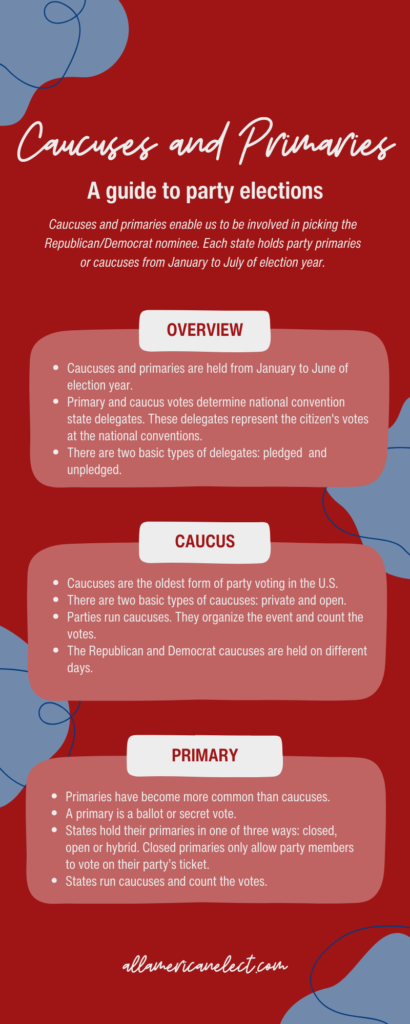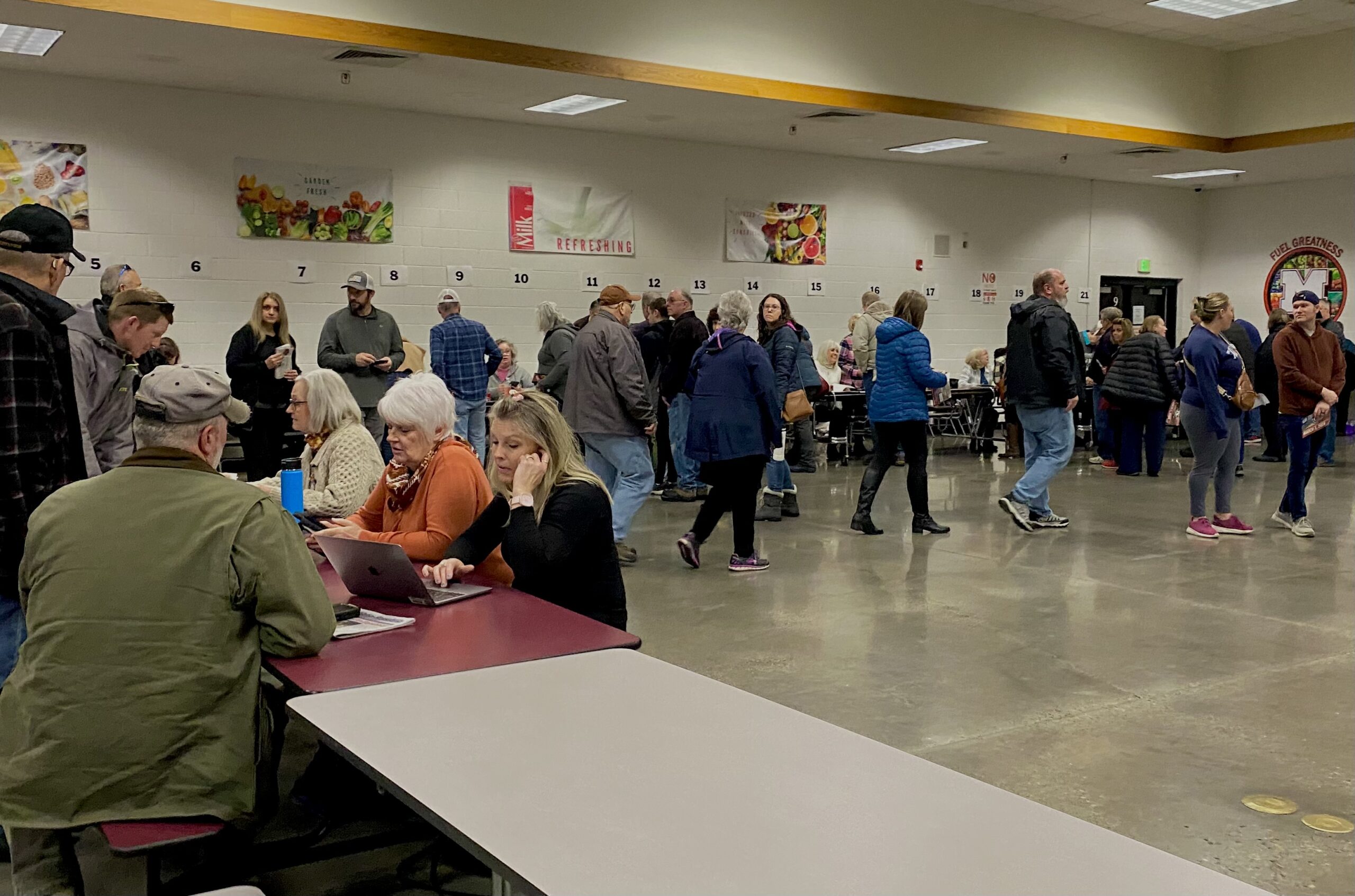It is the season for presidential primaries and caucuses! Let’s review some of the basics of caucuses and primaries.
But, before we get into the specifics, it’s important to remember that each state and each party have regulations, rules and adjustments regarding this process. With that in mind, let’s jump right in!
Caucuses and primaries involve us in the first presidential voting round. We get to help select our party’s nominee. Each state holds party primaries/caucuses from January to July of the election year.
If you have registered to vote under a specific party, typically, you can only participate in its primary or caucus.
In this stage of the presidential election process, we aren’t directly voting for the candidate. Instead, we directly or indirectly (depending on your state) vote for the party delegates who represent our vote at the national conventions. At the national conventions, the delegates vote on and choose the party’s presidential candidate.

Delegates
There are two basic types of delegates: pledged and unpledged. Pledged or bound delegates must support the candidate they are awarded through the primary/caucus process. Unpledged delegates (also known as: unbound, automatic or superdelegates) can support any presidential candidate.
Republican Party
There are four types of pledged delegates in the Republican party: pledged district, pledged at-large, pledged party leaders and pledged bonus.
Pledged district delegates are elected at the congressional district level. The party assigns three district-level delegates to each district.
Pledged at-large delegates are elected statewide. The party assigns 10 at-large delegates to each state.
Pledged party leaders are three state party leaders — national committeeman, national committeewoman and state party chair — who have been delegated the responsibility of a delegate.
Pledged bonus delegates are assigned to each state whose electoral votes went to the party nominee in the last presidential election. They are also assigned to states where the party currently holds the governorship, half of the U.S. representative seats, most of a state legislative chamber, a majority of seats in both legislative chambers and/or a U.S. Senate seat.
For more information about the number of delegates in the 2024 election see ballotpedia.org.
Democrat Party
There are three types of pledged delegates in the Democrat Party: pledged district, pledged at-large and pledged PLEO delegates.
Pledged district delegates are elected at the congressional level. The specific number of awarded delegates varies state-by-state.
Pledged at-large delegates are distributed statewide. Again, the specific number varies from state to state.
Pledged PLEO delegates are party leaders and elected officials.
The Democrat Party’s unpledged delegates usually include members of the party’s national committee, former presidents and vice presidents and/or other distinguished party leaders such as governors and senators.
More information about the number of Democrat delegates in the 2024 election can be found on ballotpedia.org.
Awarding delegates
There are three ways a party might award delegates. The Democrat Party traditionally uses the proportional method. If there are two candidates and one receives 70% of the state’s votes and the other receives 30% of the state’s votes, 70% of the delegates go to the first candidate and 30% go to the other candidate.
The Republican Party allows each state to choose its method. Each state can choose the proportional method, a “winner-take-all” system or a hybrid approach. In a “winner-take-all” scenario, the candidate with the most votes from a state primary/caucus gets all the state’s delegates.
The number of delegates each state party sends to the national conventions varies; however, the bigger the population a state has, the more delegates it sends.
Caucuses
Caucuses are the oldest form of party voting in the U.S. In this format, each party holds a meeting on the county, district, or precinct level, which party members can attend.
The state party leaders decide whether to hold a private ballot-caucus or an open caucus.
Private caucuses function a lot like primaries. Your vote is your own — it’s private and quick. Open caucuses are far looser. They are open and crowded. They function more like a party than a test.
At an open caucus, like-minded voters gather to discuss the virtues of their chosen candidate and associated delegates. After the discussion, each group might speak to the larger group about why their candidate should be chosen as the party nominee. At the end of the meeting, the voters in each group are counted.
While the state counts the votes in a primary election, the party oversees counting the votes in a caucus system. Because of this, the Republican and Democrat caucuses are traditionally on different days.
Primaries
A primary is a ballot or secret vote. It’s the typical election day image: The poll worker checks your ID, hands you a sheet of paper and a pencil and you walk over to a closed-off booth. You mark a bubble and deposit your marked sheet in the assigned tray, machine or box.
States hold their primaries in one of two ways: closed or open. Closed primaries allow party members to vote for candidates in their party. Democrats can only vote for Democrats; Republicans can only vote for Republicans. In an open primary, a registered voter can vote in the Democrat or Republican primary regardless of affiliation. The voter can only choose one primary to vote in; they cannot vote on both the Democrat and Republican ballot.
Some states have adopted a hybrid approach to their primaries. For example, a state might run a partially closed primary. This means those without a party affiliation can vote on the Democrat or Republican ballot.
The state counts and verifies the votes. At the end of the voting day, they release the results to the parties.


Comments
One response to “Brush up on the basics of caucuses and primaries”
[…] March of a presidential election year, sets the tone for the first round of presidential voting — primaries/caucuses. Historically, many states choose to hold their primaries/caucuses on this […]